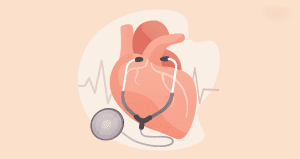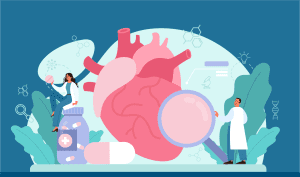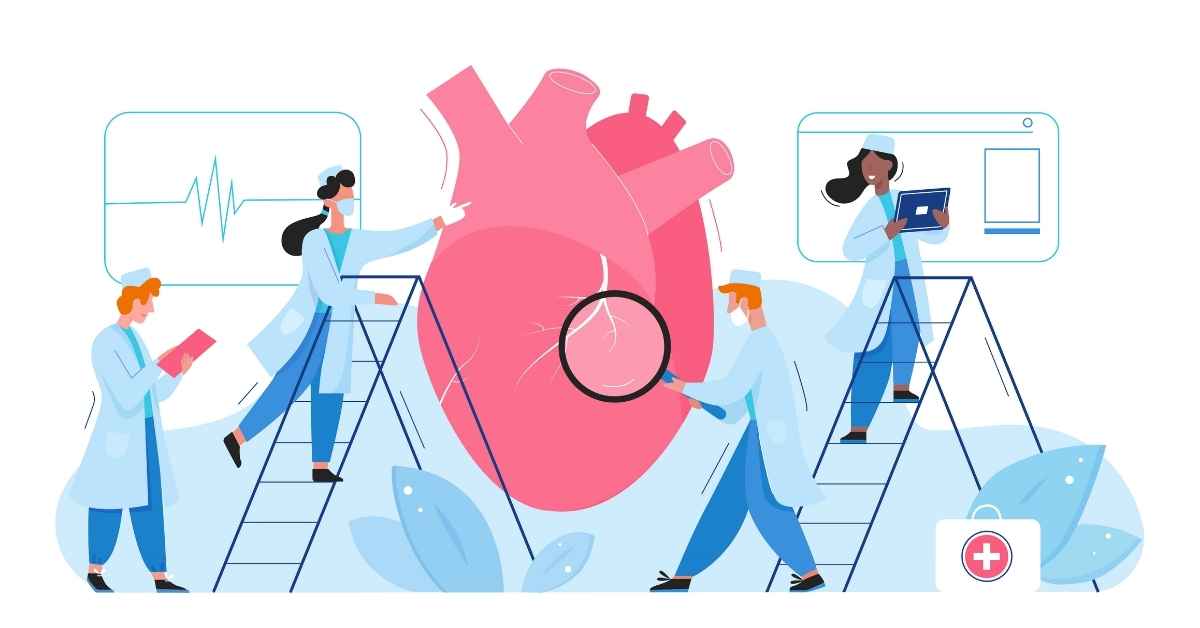Become a cardiologist is a vital healthcare professional who diagnoses, treats haematic disorders, and supports overall bodily health. Cardiologists play a crucial role in protecting the heart from diseases, improving patients’ lives significantly.

What are the Main Types of Cardiologists?
Cardiologists specialize in different areas such as interventional procedures, non-invasive diagnostics, electrophysiology for heart rhythm disorders, and paediatric care, ensuring comprehensive treatment for various cardiac conditions across different patient demographics.
Interventional Cardiologists
Interventional cardiologists perform minimally invasive procedures like angioplasty and stent placement to diagnose and treat cardiovascular conditions, ensuring improved heart function and patient well-being.
Role and Key Responsibilities:
An interventional cardiologist is a highly specialised physician who focuses on performing procedures such as angioplasty, where blocked arteries are opened, often using stents to keep them unobstructed. This expertise is crucial in restoring blood flow to the heart and treating various cardiovascular conditions effectively.
Non-Invasive Cardiologists
Non-invasive cardiologists diagnose and manage heart conditions using diagnostic tools like echocardiography and stress tests, avoiding invasive procedures.
Role and Key Responsibilities:
Non-invasive cardiologists specialise in diagnosing and managing patients with potentially serious heart conditions using techniques such as echocardiograms and stress tests, without performing invasive procedures.
Electrophysiologists Cardiologists
Electrophysiologist cardiologists specialise in diagnosing and treating abnormal heart rhythms using techniques like electrode insertion and implantation of pacemakers or defibrillators.
Role and Key Responsibilities:
Electrophysiologists are cardiologists who specialise in restoring abnormal heart rhythms to normal. They insert electrodes through a vein into the heart and may also implant pacemakers. Electrophysiologist cardiologists play a critical role in managing arrhythmias and improving the heart’s electrical activity for better patient health.
Paediatric Cardiologists
Pediatric cardiologists are medical specialists who focus on diagnosing and treating heart conditions in infants, children, and adolescents.
Role and Key Responsibilities:
A paediatric cardiologist specialises in treating heart problems in babies through to teenagers, focusing mainly on congenital heart defects and other cardiovascular conditions specific to children.
What does a Cardiologist do?
A cardiologist diagnoses and treats heart conditions, performs diagnostic tests and procedures, prescribes medications and advises on lifestyle changes, conducts patient consultations and follow-ups, collaborates with healthcare teams, and performs surgeries and minimally invasive procedures if specialized as an interventional cardiologist.

Diagnosing and Treating Heart Conditions
Cardiologists specialise in the diagnosis, treatment, and management of patients suffering from conditions such as heart failure, coronary artery disease (narrowing of the heart’s blood vessels), and arrhythmias (irregular heartbeats). They employ a range of medical interventions including medications, lifestyle adjustments, and sometimes surgical procedures to improve heart function and overall cardiovascular health in their patients.
Performing Diagnostic Tests and Procedures
Cardiologists are responsible for performing and interpreting a variety of diagnostic tests essential for evaluating heart health. These tests include electrocardiograms (ECGs/EKGs), Echocardiograms, and Cardiac Catheterisations. Through these diagnostic procedures, cardiologists can accurately diagnose heart conditions and determine the most appropriate treatments for their patients.
Prescribing Medications and Lifestyle Changes
Cardiologists prescribe medications and recommend lifestyle changes to effectively manage and prevent heart disease. Medications target specific heart conditions, while lifestyle advice focuses on diet, exercise, smoking cessation, and stress management to improve heart health and reduce cardiovascular risks.
Conducting Patient Consultations and Follow-Ups
Cardiologists oversee the complete care of patients’ heart health, conducting initial consultations, follow-up appointments, and long-term monitoring to ensure effective treatment and management of heart conditions.
Collaborating with Other Healthcare Professionals
Cardiologists collaborate with primary care physicians, surgeons, and specialists to plan and monitor treatments for their patients, ensuring comprehensive and personalised care for heart conditions.
Performing Surgeries and Minimally Invasive Procedures (For Interventional Cardiologists)
Interventional cardiologists specialise in minimally invasive procedures like angioplasty, stenting, and valve repair to effectively diagnose and treat cardiovascular conditions such as coronary artery disease and valvular disorders. These procedures offer patients quicker recovery times and less invasive treatment options compared to traditional surgery.
Average Salary Range of a Cardiologist
The average salary range of a cardiologist varies based on their experience, geographical location, and the specific healthcare setting. Factors influencing salaries include years of experience, specialisations within cardiology, and the type of institution or practice. Generally, salaries tend to be higher in urban areas and specialised medical centres compared to rural or community settings, reflecting the demand for cardiovascular expertise and the local healthcare market.
Salary Ranges Based on Experience and Location
Salaries for cardiologists vary depending on experience, subspecialty, location, and type of healthcare setting. In the UK, entry-level cardiologists typically earn between £80,000 and £120,000 annually. In the US, their counterparts earn between $200,000 and $300,000 per annum. Mid-level cardiologists can expect to earn between £120,000 and £180,000 in the UK, and between $300,000 and $400,000 in the US. Senior cardiologists or those in specialised roles can command salaries ranging from £180,000 to £250,000 or more in the UK, and from $400,000 to $500,000 or more annually in the US. These figures reflect the diverse factors influencing pay scales across different regions and healthcare environments.
Comparison of Salaries in Different Regions and Healthcare Settings
Salary ranges can also vary based on location, with higher salaries typically offered in urban areas and regions experiencing greater demand for healthcare services. Cardiologists employed in private practice or specialised healthcare settings may also earn higher salaries compared to those working in general hospitals.
Factors That Influencing Cardiologist Salaries
Several factors can influence cardiologist salaries such as;
- Experience: Experienced cardiologists typically earn higher wages due to their advanced skills and established patient base.
- Education/Board Certification: Cardiologists with higher levels of education or board certification generally earn higher salaries.
- Specialty: Cardiologists can command significantly different salaries based on their specialisation (e.g., interventional cardiology versus electrophysiology) and geographical location, even with similar foundational training.
Essential Skills of a Cardiologist
Essential skills for cardiologists include proficiency in technical skills such as diagnostic tools and procedures for treating heart conditions, alongside strong soft skills like effective communication and empathy for building patient trust and providing compassionate care. Adept problem-solving abilities and efficient time management further ensure comprehensive patient management and effective healthcare delivery.
Technical Skills
- Proficiency with diagnostic tools and procedures: Essential Skills of a Cardiologist include advanced proficiency with diagnostic tools and procedures essential for accurate identification and treatment of various heart conditions.
- Knowledge of CV Disease and Treatments: A comprehensive and expert-level understanding of cardiovascular diseases and treatments is imperative to ensure high-quality patient care and effective management of cardiac health.
Soft Skills
- Ability to communicate: Essential Skills of a Cardiologist encompass effective communication and a compassionate bedside manner crucial for fostering trust and facilitating shared decision-making with patients.
- Empathy: Empathy plays a pivotal role in understanding and addressing patients’ concerns, ensuring compassionate and personalised care.
- Problem-Solving: Strong problem-solving abilities are essential for navigating complex cases of heart disease, while efficient time management skills enable cardiologists to effectively balance multiple patient care responsibilities and tasks.
- Time Management: Efficient time management skills help cardiologists handle multiple patients and responsibilities.
Career Development Tips for Cardiologists
For cardiologists, career development involves staying updated with medical advancements, networking through professional organisations and conferences, gaining practical experience through internships and residencies, and consistently improving diagnostic and interventional skills. These steps are essential for staying competitive and advancing in cardiology.
- Staying updated with Medical Advancements and Research: It’s essential for cardiologists to continuously learn and stay current with the latest developments in cardiology.
- Networking through Professional Organisations and Conferences: Engaging with professional organisations and attending medical conferences provides valuable networking opportunities and resource access.
- Gaining Experience through Internships and Residencies: Internships, residencies, and fellowships are crucial for aspiring cardiologists to gain experience, hone their skills, and establish their professional reputation.
- Practising and Improving Diagnostic and Interventional Skills: Consistently practising diagnostic and interventional skills is vital for cardiologists to succeed in their careers.
Qualifications and Requirements for Cardiologist
Qualifications and requirements for cardiologists include completing rigorous educational training, obtaining certification from professional boards, and gaining practical experience through residency programmes. These ensure cardiologists are well-equipped to diagnose and treat cardiovascular conditions effectively.
Educational Requirements
- Bachelor’s Degree in a Relevant Field: Obtain a bachelor’s degree in necessary, ideally in biology or pre-medical studies.
- Medical Degree (MD or DO): Attain a medical degree (MD or DO) from medical school to become a licensed physician.
- Related Cardiovascular Coursework: Engage in comprehensive studies of cardiology during classes and in preparation for examinations.
Certification Requirements
- Board Certification in Cardiology: Achieving board certification demonstrates the cardiologist’s competence and commitment to professional standards.
- Board Certification Examination Requirement: Passing the board certification examination administered by a recognised medical board or institution.
Experience Requirements
- Internships, Residencies, and Fellowships in Cardiology: These programmes are crucial for developing advanced skills and establishing a professional reputation in the field.
- Clinical Practice: Practical experience in clinical settings under supervision is necessary to apply theoretical knowledge and develop practical expertise in diagnosing and treating cardiovascular conditions.
How to Become a Cardiologist
To become a cardiologist, aspiring professionals should complete relevant education, including a bachelor’s degree and medical school. Gaining practical experience through internships and residencies is crucial. Obtaining certification through board exams demonstrates competence. Continuing professional development and networking are vital for staying current and advancing in the field. Essential skills include diagnostic proficiency, communication, and empathy.
Completing Relevant Education
- Getting a Bachelor’s Degree: The first step is to complete a bachelor’s degree in a relevant field.
- Attending Medical School and Earning a Medical Degree: Progress to attending medical school and earning an MD qualification.
Gaining Practical Experience
- Internships and Residencies in Internal Medicine: Gain broad experience treating various medical conditions during internships and residencies in internal medicine.
- Cardiology Fellowship: Specialise in the diagnosis and treatment of heart disease by completing a fellowship in cardiology.
Obtaining Certification
- Board Certification in Internal Medicine and Cardiology: Qualify and demonstrate expertise and commitment to practice standards by meeting the requirements for certification.
- Passing Specialty Examinations: Show proficiency and specialised knowledge in subfields of cardiology such as interventional cardiology or electrophysiology by passing relevant specialty examinations.
Continuing Professional Development
- Workshops, Seminars, and Conferences: Participate in ongoing professional development through workshops, seminars, and conferences.
- Advanced Training and Specialisations: Pursue further training and specialisations to enhance your expertise.
Networking
- Join a Professional Organisation: Become a member of a British Cardiac Society chapter to network with peers and stay updated in the field.
- Attending Medical Conferences and Events: Participate in medical conferences and events to network with experienced medical professionals. Engage directly with speakers to gain insights into the latest challenges and advancements in healthcare.
Get Qualified as a Cardiologist
Frequently Asked Questions (FAQ)

- Why Choose Cardiology as a Career?
Caring for patients as a cardiologist can be deeply rewarding and impactful for several reasons such as diagnosing and treating heart conditions, positively changing patients’ lives, contributing to new research in cardiovascular health, the essential role of cardiology in healthcare, job security, and personal growth through helping patients lead heart-healthy lives.
- Is Cardiology a Good Career Choice for You?
If you excel in detail-oriented environments, thrive in high-stakes situations, have a passion for continuous learning, and enjoy connecting deeply with patients, cardiology could be an ideal career path. Whether you’re interested in the intricacies of the cardiovascular system, problem-solving, or conducting bedside research, cardiology offers diverse opportunities for ambitious individuals pursuing clinical excellence.
- How much does a Cardiologist Earn?
Salaries for cardiologists vary based on experience, region, and healthcare setting. In the UK, entry-level cardiologists earn between £80,000 and £120,000 annually, while in the US, the range is $200,000 to $300,000. Mid-level cardiologists can earn between £120,000 and £180,000 in the UK, or $300,000 to $400,000 in the US, and senior or specialised cardiologists may earn £180,000 to £250,000 or more annually in the UK, or $400,000 to $500,000 or more in the US.
- Qualifications for a Career in Cardiology
To become a cardiologist, start with a bachelor’s degree in biology or pre-med, followed by earning an MD or DO degree from medical school. Gain practical experience through internships, residencies, and fellowships in cardiology. Achieve board certification in cardiology to demonstrate proficiency and adherence to professional standards. Continuing education and research are crucial to staying current in the field and enhancing qualifications.
- Do I Need to Be Experienced to Get Started?
No prior experience is necessary to begin a career in cardiology. Enthusiasm, a commitment to learning, and a passion for cardiovascular medicine are essential qualities for success in this field.
- Cardiologist Career Outlook
Cardiology offers excellent job security due to the ongoing demand for skilled professionals in healthcare, particularly as heart disease rates continue to rise. Cardiologists enjoy competitive salaries and opportunities for career growth, whether in specialised fields or leadership positions within healthcare organisations.
- Career Progression in Cardiology
Career progression in cardiology typically advances from entry-level positions as a resident or fellow to mid-level roles such as attending cardiologist or senior cardiologist, following years of experience and additional specialist training. Advanced positions like department head or medical director require further skill development, advanced certifications, and leadership capabilities.
- Opportunities Beyond Cardiology
Cardiologists have diverse career opportunities beyond clinical practice, including roles in medical research, healthcare administration, or academia. Transferable skills make them suitable candidates for leadership roles in healthcare organisations or pursuing advanced degrees such as PhDs for careers in education or consulting in cardiovascular medicine.


